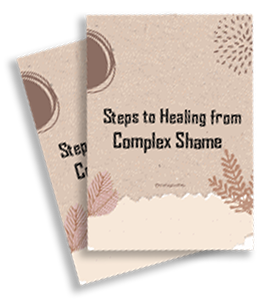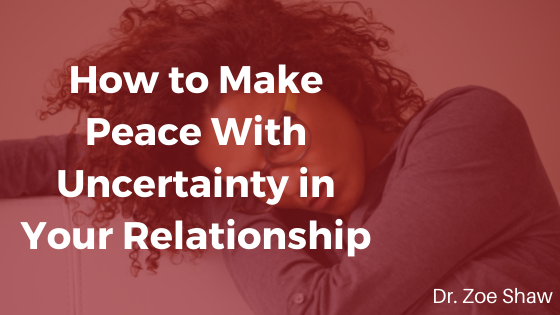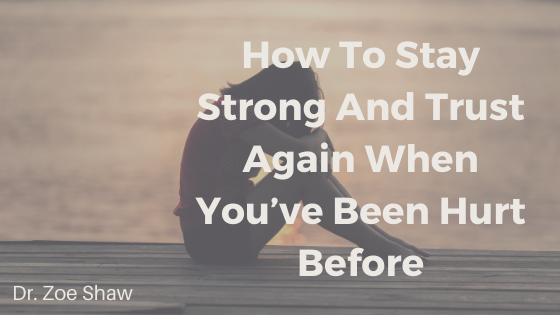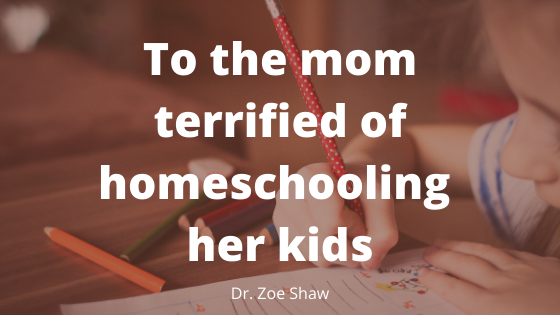I remember being a young newlywed and I was young- 19 when I got married. My husband is significantly older than I am and he had a close friend in her 40’s. She was divorcing her husband of 20 years. I remember thinking: How could someone divorce after that long?
I immediately thought, what does that mean for my marriage? Could I be married to this man for 2 decades and still not have the certainty of our relationship? That thought threw me for a loop because I hoped that marriage would provide me with the certainty and peace that I wanted. And of course, it did not. Why? Because I brought myself into this marriage. That’s what we all do.
What you bring into a marriage with you is what you will continue to have. No amount of years will fix this. Only you can.
So, if you are struggling with uncertainty, longing for clarity and a fix it, I will sit with you and your uncertainty for our time together today.
It’s okay if you don’t possess certainty for tomorrow. It’s not really needed. You can still have peace today with uncertainty about tomorrow.
How does unchecked uncertainty affect you?
A state of ambiguity feels like a threat to our system. We strive for certainty because it feels safe. It is, of course an illusion. Humans have a complicated relationship with uncertainty. We like the excitement of it when it doesn’t directly affect us emotionally. We love watching a thriller or a mystery because we have the knowledge that it will end well- this knowledge that we can’t have when we are in the midst of our own personal uncertainty.
However, In real life, any questions we ask of our brain that are left unanswered cause stress. That stress gets housed in the body. That’s one of the reasons why being in a difficult or unhealthy relationship increases your risk of having an illness or disease.
When my 19-year-old self asked that question about my marriage and no answer could be provided, I felt stress. When we ask a question and it is answered, we feel relief. See, the reason we go on that roller coaster at the amusement park or we watch that thriller is not just for the excitement, but for the feeling of relief we experience when it is all said and done. It’s because we know it’s safe. The journey is already set from beginning to end. It’s exciting, but it’s a closed-loop. Open loops that happen in real life are terrifying and stressful.
Researchers (at UCL funded by the MRC) found that humans dislike uncertainty so much that if we have to choose between a scenario in which we know we will receive electric shocks versus a situation in which the shocks will occur randomly, we’ll select the more painful option of certain shocks.
I am a risk taker, which means I am more tolerant of uncertainty than most, so I don’t know if that applies to me, but I know I felt stress at the thought of the uncertainty of my marriage.
When there is uncertainty we tend to react, but not in a rational way.
John Jennings reminds us of all the people during the initial lockdown stay at home order who rushed out and cleared the stores of paper towels because of the uncertainty of lock down. Even then, but certainly in retrospect, we can see the ridiculousness of this action.
They should have been going to the library and stocking up on great books, getting a haircut or hitting the movie theatre one last time, but they took action to assuage some fear, but lack of paper towels wasn’t the problem, was it? They created a brand new problem.
If you are feeling uncertain, be careful not to take unnecessary action, which will sometimes make a situation worse.
For example, reacting by becoming overly needy, which I did, only creates a reaction in your partner which pushes you away.
You may be looking for cognitive closure, but what you really need is to sit with the discomfort. To trust your ability to take on the unknown, to re-assure yourself that your greatest fears rarely happen.
Instead, focus on what you can control- and it’s not other people. You can decide what you will or won’t do in the case that the thing happens or doesn’t happen and remind yourself that you will be okay.
Make a plan B. If you find that you are pre-occupied with worry about what will happen, go ahead and work out a plan B, so that you can get back to being in the present.
Go ahead and ask and answer the difficult questions. What if my husband makes a decision to take this job he was just offered that’s 3000 miles away and I don’t want to quit my job here? This isn’t ideal, but you can figure out how you will work it out to the best of your ability.
You could ask your job to tele-work. He could ask to tele-work. You could figure out how to maintain a bi-coastal relationship for a season. You could figure it out. You will figure it out.
What if he dies or what if we grow apart or he decides he doesn’t want to be married to me anymore? What if I push people away who love me? Then what? These are questions that can feel scary to answer, but go ahead, venture in and answer them. It’s the not answering that is the most scary. It’s the not answering. You will be okay and you will figure it out. When you answer, you can steal back your present from the future.
When you stop the catastrophic stories by providing possible solutions, you reduce the stress caused by unanswered questions.
Focus on all the good that exists here in your world and make sure that you are de-stressing every day through exercise, yoga, meditation or journaling. Deep breathing and reminding yourself that you are safe and okay right here right now can be helpful.
Sometimes the uncertainty is due to a power imbalance. You are waiting on the other to decide if they’re really in this or not- if they want to continue the relationship or not. The uncertain partner is getting exactly what they want- they have you still on their terms, but aren’t required to provide the reciprocity of security in this relationship. This kind of uncertainty can feel excruciating- the entire trajectory of your life hanging in a balance.
Here’s what I have to say about that.
You still get to make a decision. If you are in the waiting phase, if you feel the relationship deems this effort, you make a decision that the relationship is over and figure out how to move forward with your life.
I didn’t say it was easy, but it breaks you from the uncertainty. If your partner comes back and says, “I made up my mind I want to work on it” or “I want to be committed in this relationship,” then you have some concrete decisions to make. But waiting to see if someone is accepting or rejecting you is not the space you want to be in. When you accept that it is over and begin to move forward in a healthy, albeit, painful way, you win.
How? Should you immediately move out, start divorce proceedings? No, none of that is necessary. All divorces are internal states. The possession separating and paper signing is not the divorce. The divorce happens in your mind and heart. And sometimes it never does. So you start by your mindset- by what you tell yourself, by how you allow yourself to interact with a partner who is deciding.
If your uncertainty is caused because deep down, you don’t feel like your partner knows the real you- If you don’t feel comfortable sharing your insides or if you feel like you have to hide a part of yourself from your partner, this will leave you feeling uncertain about the relationship.
If this is the case, there’s some action to take. It involves speaking the truth. You will find that when you say, “Oh hey, you know the way you always order for me when we go on date night? I actually don’t like it” and then when you speak the deeper truth, “ I haven’t felt comfortable telling you that, because…” you will experience increased intimacy. It might create an emotional reaction in your partner, but that is real and can be dealt. Allowing your partner to know you deeply creates necessary certainty and freedom in your relationship.
Here is when uncertainty can be a red flag in relationships:
1. If you find yourself making excuses for your partner to such an extent that you are too embarrassed to tell your close friends some of the things your partner does
2. You feel the need to significantly change or bend yourself in order to keep your partner.
3. If you distract yourself with busyness and hobbies and avoid being in the relationship. Years can go by this way.
4. You fantasize often about not being with your partner anymore.
If you recognize these in yourself, it’s time to get some professional help to develop some clarity for yourself.
Here’s what I know. Change is certain. Although you never know what tomorrow will bring, you can rest assured that there is a God who is in control, that you have developed skills overtime to survive, and that you can choose to switch your lens from dread to the excitement of the next chapter of your life as you walk through your daily pace, sometimes waiting and sometimes making decisions about what happens ahead.
We aren’t fixing him, we’re fixing you and that changes everything!

Subscribe and Heal your Relationships.
You deserve a healthy, loving relationship and it starts with You. Learn how to untangle
Complex Shame™ and co-dependency to finally have the beautiful, secure relationship with
yourself and others that you’ve always wanted.
Subscribe and as a thank you, I’ll send you the Steps to Healing from Complex
Shame™.













